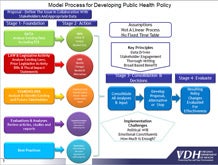Projects and Outcomes
| Resources provided to the ESPHL teams: – Three leadership retreats – Readings utilizing the Aspen Institute’s time-tested approach to values-based leadership – Regular feedback from an ESPHL Advisory Committee of experienced leaders in public health law and policy – Project feedback and regular progress check-ins with JSP staff – Technical assistance resources identified by the Aspen Institute, RWJF, and the ESPHL Advisory Committee – Technical assistance funding of up to $17,500 per team – Peer mentorships and an alumni network, to share ideas and ongoing work with ESPHL colleagues |
Eight state teams from across the nation. Eight innovative projects with the goal of advancing public health through state policy and law.
The Excellence in State Public Health Law (ESPHL) program was developed by the Aspen Institute Justice & Society Program (JSP) with funding from the Robert Wood Johnson Foundation (RWJF). We focused on building teams across branches of state government to target public health challenges. The vision: that when we build relationships between the state public health agency and members of the legislative branch and the governor’s office, we will get better results than any of these actors working on their own.
Teams were selected through a competitive application process, and the team leads were the state health officials or high-level designees. The projects were diverse and reflected the priorities of the participating states. Hawaii worked on oral health for Medicaid eligible children, Arkansas and Virginia investigated joint use agreements and access to sports, Rhode Island laid the groundwork for its new concept of neighborhood health stations, Minnesota looked to reduce adult binge drinking, Washington sought to encouraging breast feeding, Louisiana examined ways to promote healthy eating, and Connecticut worked to strengthen the relationship between local and state public health agencies.
ESPHL participants reported that the team-based approach:
- Brought down silos and barriers to collaboration, enabling team members to see each other as partners in the policy process, building relationships of trust and fostering shared innovation
- Allowed them to learn from other states facing the same public health challenges
- Built their understanding of the constraints on and perspectives of other branches of government
- Taught the importance of early stakeholder involvement
- Taught the importance of framing and messaging (both the value of data, and how data is presented to different audiences)









